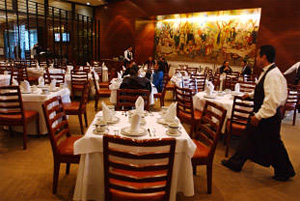 |
 |
 |
 News Around the Republic of Mexico | August 2006 News Around the Republic of Mexico | August 2006  
Turmoil Slows Tourism
 Marion Lloyd - Houston Chronicle Marion Lloyd - Houston Chronicle


| | A restaurant in one of Mexico City's luxury hotels is nearly empty on Tuesday. (Jennifer Szymaszek/Chronicle) |
Mexico City - Taxi muggings. Corrupt cops. Infamous smog.

If the Mexican capital didn't have enough image problems for tourists, here's one more: a ragtag protest camp stretching for miles along the city's cultural corridor.

The 12-day-old street blockades orchestrated by the leftist presidential challenger, Andrés Manuel López Obrador, have cost the city's tourism industry $12.5 million a day, according to the Mexico City Hotel Association.

And they warn the situation could worsen if the standoff isn't resolved soon.

López Obrador claims the July 2 elections, which official results say he lost by a whisker, were fraudulent and has called for mass civil disobedience until authorities agree to a full recount.

The electoral courts have until Sept. 6 to declare a new president or call for fresh elections.

"This is a very serious blow to tourism in Mexico City and the country in general," said Jesus Rocha, president of the Mexican Association of Wholesale Tourism Operators.

Estimating the local economic impact of tourism is an inexact science, and these discussions also include a political element.

The city government, which is run by López Obrador's Democratic Revolution Party, is downplaying the effects of the political standoff on tourism.

Only 50 of the capital's 650 hotels have been affected, said Carlos McKinley, director of the city's Institute of Tourist Promotion.

McKinley said many of the visitors had simply moved to hotels outside the conflict zone.

Rocha notes that Mexico's tourism industry — the country's third-largest source of foreign income after oil and remittances from migrants — was already suffering from escalating drug violence and labor disputes affecting tourist hot spots.

Human heads in Acapulco

In Acapulco, human heads have turned up on a beach and in front of government offices — apparent victims of the drug wars.

And earlier this summer, striking teachers in the colonial city of Oaxaca have clashed with police and hassled tourists with makeshift checkpoints.

"Foreigners get the feeling that the country is in crisis," Rocha said. "They think
we're in the midst of a revolution."

The political protests have undercut a recent campaign by López Obrador, who served as mayor from 2000 to 2005, to boost Mexico City's tourism industry through a $100 million restoration of its historic center.

Improvements include miles of new pedestrian walkways, dozens of refurbished colonial buildings and a gleaming convention center overlooking a renovated park.

Foreign tourist arrivals have jumped 20 percent annually since 2002, said Gonzalo Brockmann, president of the city's hotel association.

Last year, 12 million people checked into Mexico City hotels, 3 million of them foreigners, he said.

Altered impressions

On Tuesday many of the hotels and museums in the historic center were nearly empty.

Angry hotel owners, meanwhile, have asked the city government to exempt them from paying taxes until the protests end.

"This isn't any way to sell the city to tourists," said Carmen Nuño, 55, of Spain, peering out at the sprawling tent city outside her downtown hotel. "We didn't have a good impression of Mexico City, and now it's even worse."

Antonio Briseño, a taxi driver who offers tours to visitors, agreed.

During the first few days of the protests, "the tourists didn't have any choice but to suffer the ordeal with us," Briseño said. "But now they're simply staying away."

"We recognize that some hotels lose out, but others win," he said, adding that with the exception of the popular bus tours of the historic center, all other tourist attractions were open for business.

For some tourists, however, the sprawling tent camps add to the city's gritty allure.

"I think it's great that people are actually out there trying to do something," said Anne Marie Kingston, 23, an elementary school teacher from Los Angeles.

After spending 10 days in Oaxaca, she arrived in the capital on Sunday in time to witness a protest by hundreds of thousands of López Obrador supporters.

"People were angry in the United States when George Bush won, but nobody did anything," she said, referring to the disputed 2000 presidential elections. "Hopefully, we can learn something from people here standing up and demanding a recount." | 
 | |
 |



